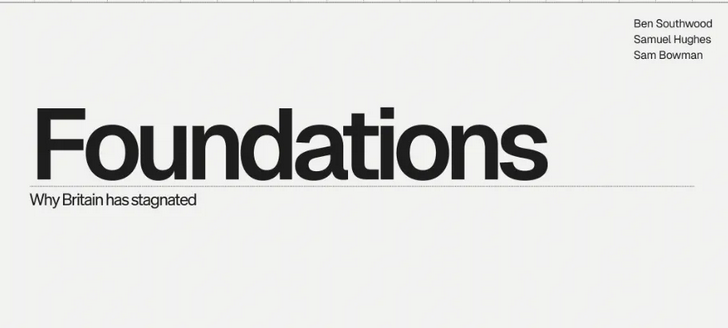Ed West reviews a new essay by Ben Southwood, Samuel Hughes, and Sam Bowman which tries to identify the underlying reasons for British economic stagnation:
The theme running through the essay is that the British system makes it very hard to invest and extremely expensive and legally difficult to build, making housing and energy costs prohibitive.
While we all know we have fallen in status, “most popular explanations for this are misguided. The Labour manifesto blamed slow British growth on a lack of “strategy” from the Government, by which it means not enough targeted investment winner picking, and too much inequality. Some economists say that the UK’s economic model of private capital ownership is flawed, and that limits on state capital expenditure are the fundamental problem. They also point to more state spending as the solution, but ignore that this investment would face the same barriers and high costs that existing infrastructure projects face, and that deters private investment.”
The problem is that “all of these explanations take the biggest obstacles to growth for granted: at some point it becomes impossible to grow when investment is banned”.
Even before the Russian invasion of Ukraine, the industrial price of energy had tripled in under 20 years. Per capita electricity generation in Britain is only two-thirds that of France, and a third of the US, making us closer to developing countries like Brazil and South Africa than other G7 states. Transport projects are absurdly expensive, mired by planning rules, and all of this helps explain why annual real wages for the median full-time worker are 6.9 per cent lower than in 2008.
In one of the most notorious examples, the authors note that “the planning documentation for the Lower Thames Crossing, a proposed tunnel under the Thames connecting Kent and Essex, runs to 360,000 pages, and the application process alone has cost £297 million. That is more than twice as much as it cost in Norway to actually build the longest road tunnel in the world.”
Britain’s political elites have failed, they argue, because they do not understand the problems, so “they tinker ineffectually, mesmerised by the uncomprehended disaster rising up before them”.
Even “before the pandemic, Americans were 34 percent richer than us in terms of GDP per capita adjusted for purchasing power, and 17 percent more productive per hour … The gap has only widened since then: productivity growth between 2019 and 2023 was 7.6 percent in the United States, and 1.5 percent in Britain … the French and Germans are 15 percent and 18 percent more productive than us respectively.” The gap continues to widen, and on current trends, Poland will be richer than the United Kingdom by the end of the decade.
Britain began to fall behind after the War, but after decades of relative stagnation, its GDP per capita had converged with the US, Germany and France in the 1980s, and our relative wealth peaked in the early Blair years. (Personally, I wonder if one reason for the great Oasis nostalgia is simply that we were rich back then.) If Britain had continued growing in line with its 1979-2008 trends, average income today would be £41,800 instead of £33,500 — a huge difference.
France is the most natural comparison point to Britain, a country “notoriously heavily regulated and dominated by labour unions”. This is sometimes comical to British sensibilities, so that “French workers have been known to strike by kidnapping their chief executives – a practice that the public there reportedly supports – and strikes are so common that French unions have designed special barbecues that fit in tram tracks so they can grill sausages while they march.” Only in France.
It is also heavily taxed, especially in the realm of employment, and yet despite this, French workers are significantly more productive. The reason is that France “does a good job building the things that Britain blocks: housing, infrastructure and energy supply”.
With a slightly smaller population, France has 37 million homes compared to our 30 million. “Those homes are newer, and are more concentrated in the places people want to live: its prosperous cities and holiday regions. The overall geographic extent of Paris’s metropolitan area roughly tripled between 1945 and today, whereas London’s has grown only a few percent.” One quality-of-life indicator is that “800,000 British families have second homes compared to 3.4 million French families“.
They also do transport far better, with 29 tram networks compared to seven in Britain, and six underground metro systems against our three. “Since 1980, France has opened 1,740 miles of high speed rail, compared to just 67 miles in Britain. France has nearly 12,000 kilometres of motorways versus around 4,000 kilometres here … In the last 25 years alone, the French built more miles of motorway than the entire UK motorway network. They are even allowed to drive around 10 miles per hour faster on them.”




